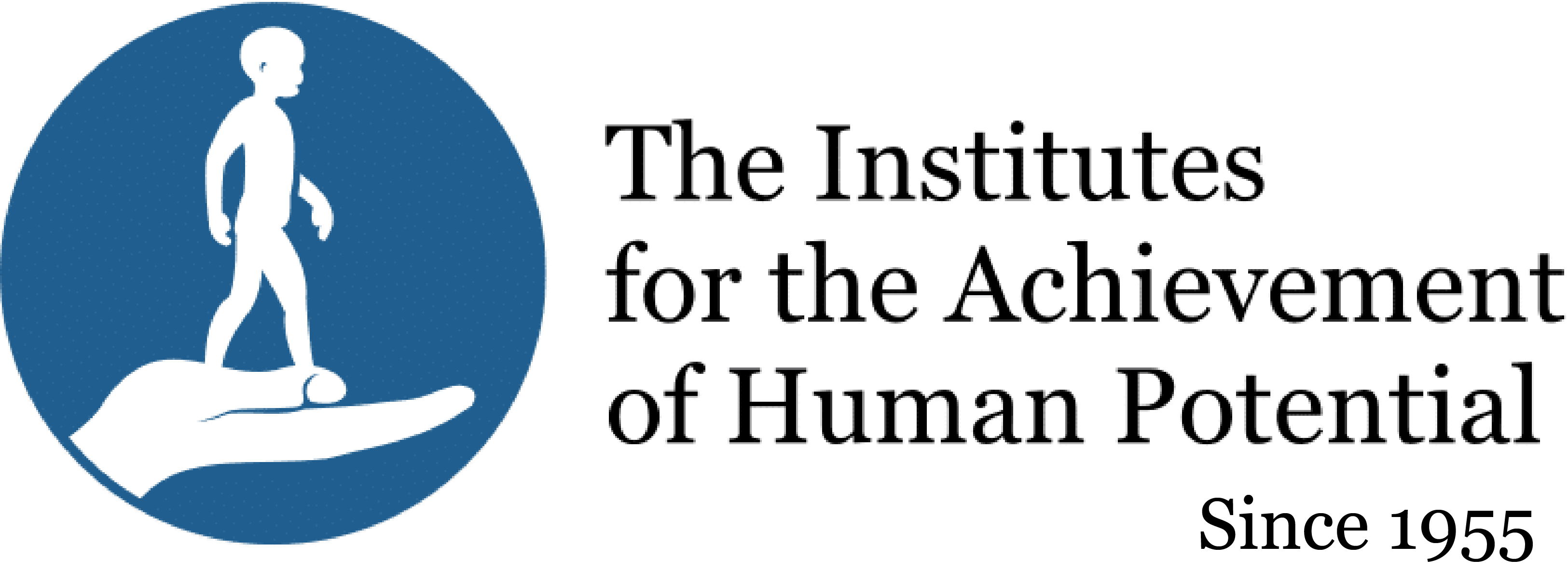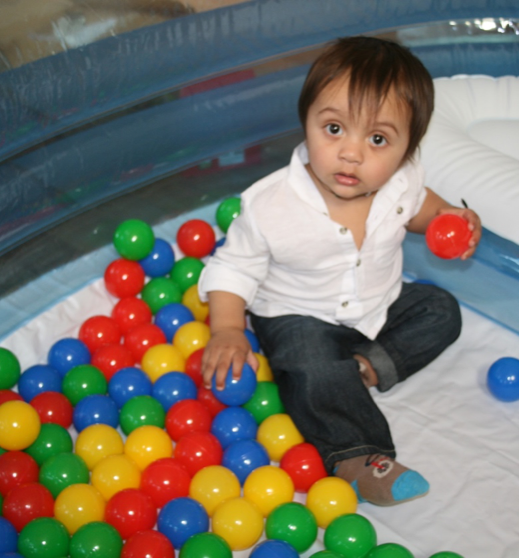101 Years Ago Today

Glenn J. Doman, born August 26,1919
When I was eighteen years old my father wrote an essay. That essay offered a crystal clear vision of a future that I wanted to help create. It gave me a clear path and a clear purpose. For this reason it was very dear to me then, and it is dear to me today. It is still my favorite of all the wonderful things he has written. We offer it here in celebration of his 101st birthday.
A Matter of Truth and Options
There are few more important topics to which man can turn his attention than to the subject of his own potential. Perhaps man’s most ancient dream is the heady idea that he might not only change the world around him, which he has done at an almost unbelievable rate, but indeed change himself in significant ways and markedly for the better.
The concept that we need no longer wait upon a thousand genetic accidents occurring in the majestic millions of years by which geological time is measured, but may instead have the knowledge at hand to take the first steps along a purposeful rather than accidental road to man’s improvement of his own human condition, is an exhilarating and even an intoxicating thought.
There is much theoretical evidence and indeed a good deal of hard fact to indicate that we are today in such a position, however, as seems to be the case with most intoxicants after the first exciting thrill is experienced, the return to a more substantial reality generally brings with it the same facts and perplexing questions that existed prior to the time one allowed himself the heady potion.
Perhaps the essential nagging question that existed before and remains behind the intoxicating drink or luxurious concept is this. If it is possible to create a superior child in physical, emotional and intellectual terms, what should such a child be like?
In the time-honored consideration of man’s most ancient dream it seems we have assumed that the difficult question was how to change him and that we have rather assumed that we could all easily agree on what he should be like.
Now on the dawn of a new day in which it appears feasible to change him in physical, emotional and intellectual terms it becomes necessary to ask the other and perhaps more difficult question.
If for the moment it is assumed that changing him is not only feasible but that we know how to do it in its entirety, we are then faced with the ultimate question of what we should choose to make him. In an instant words like creativity, productivity, happiness and a hundred others come to mind, and almost as immediately a hundred questions follow the words. There are moral questions, practical questions, ethical questions and many more, and these are proper questions. Is happiness necessarily an important goal?
Whatever the answers to these questions may be, it seems crystal clear that they must not be left to ethologists alone but are questions for theologians, philosophers, and a host of others from the world of man and of machines. Such questions will require time and worlds of thought, but perhaps we need not await that ultimate answer before taking certain steps on the road to elevation of the next generation of children, and thus elevation of the adults that the children will become, since the child is father to the man.
To begin the process, it seems to me, we need only agree on two things. First, that knowledge leads to good and that ignorance leads to evil.
Herbert Spencer once stated a thought that at once was both overwhelming and devastating. He said, “The profoundest of all infidelities is the fear that the truth will be bad.”

Happy Birthday, Glenn, we love you, we miss you, the home fires of The Institutes are burning brightly. You have taught us what to do and we are doing it. You have taught us never to give up and we will never give up. Wherever you are right now – behave!
Perhaps we might agree that children able to learn more, learn better, and learn more easily would be a step in the right direction, no matter where that road should eventually lead. These things we can do today.
Regarding the point as to whether we might find agreement on what a superior child should be like, we turn to the reality of the brain-injured child who has done so much in turning our eyes in this new direction and who has provided such a valuable key to understanding and reality.
If one wishes to know what the apotheosis of a superior child should be like, he need only look at his opposite in the near absolute. His absolute opposite is a dead child. His almost absolute opposite is the severely brain-injured child. Most significantly and most clearly it is the state of the brain that is the difference.
Let us consider a severely brain-injured child. He is unable to move or to make sounds. He can do almost nothing. In terms of correctness, he can do nothing correctly. He does not see, hear, feel, taste, smell or eliminate correctly. In his worst state he can do nothing except breathe and he does that most poorly. The question of the moment with this child is not how well he will do in school. The question is not even how he will take his next breath, but is whether he will take his next breath. Frequently such a child does not.
When one has had the opportunity to be confronted with many such children, slowly the fact is borne home that the situation he is seeing can be reduced to the question of options.
His situation is characterized most clearly by his total and overwhelming lack of options.
He has no single option available to him. He cannot breathe well, and he cannot even choose to stop breathing.
Society’s job, seen in this light, becomes so crystal clear. It is to give him options so that he may choose among them. We must begin with a single option. Perhaps first we must give him the ability to breathe well so that he may then have his first choice in life, to breathe well or to breathe poorly. Then we must make him able to move so that he may thus opt to move or not to move, or to move sometimes and at other times be still. We must make him able to talk so that he may choose to talk or be silent. We must then give him the ability to walk and then the ability to use his hands. We must provide him with ever-greater number of options. We must someday give him the ability to read and to write and to run and to jump. We must forever expand to the utmost possibility his number of options. He must have the ability to read Shakespeare as well as comic books, to write profound thoughts and to write poetry as well as to write grocery lists.
I do not hold that he must read Shakespeare or Chardin anymore than he must read comic books or racetrack sheets. I hold only that we must give him the ability to do so so that he may then, as a freed human and a free spirit, exercise his own option as to what he chooses to read, to write, to pursue in life, to vote or not to vote and to make a decision as to whom he shall vote for.
If we cannot, at this point in time, agree as to what a superior child should be, surely we can agree that—like his opposite, the brain-injured child—he should be supplied with as wide and large a variety of options as possible.
As a child I was provided by my parents with an opportunity to know and to love fine art so that I might choose to love or to reject it as I saw fit. I chose to love it and great joys have been opened to me as a result. However, when I was a child, great art was defined to me as paintings that looked like what they represented. As a young man I was confronted with modern art that was not restricted to looking like what it represented. I do not like most modern art and I am obviously the loser. I have the perpetual feeling that the artist, if artist he is, is pulling my leg.
One must quickly realize that I have not chosen to dislike modern art. The truth is much more sad. I never had a choice to make. By the standard given my brain, modern art is not art at all. How sad for me. I must now forever lose whatever pleasure modern art might have held for me and be forever consigned to the dark suspicion that those who enjoy modern art should not be enjoying it. How nice it would have been had I had the option of enjoying it or not so that I might have rejected it and confirmed my now unchangeable bias.
I do not hold that a child must be forced to like or to do anything, for I cannot be positive, even for myself, what is worth and what is not worth liking or doing.
This I know without question, that for the child and for me we shall both of us have to make choices and to stand on those choices.
This much seems clear to me. The severely brain-injured child is without capability, and as a result without options. That is his problem.
The apotheosis of his opposite, the superior child of tomorrow will be the child with the greatest capability and as a result with the greatest number of options. That is his goal and his glory.
In short, should we not give the child the greatest capabilities we can give him in terms of his ability to perform, talk, read, and write and thus present him with huge stores of knowledge, and thus huge stores of options?
Indeed, is not greater knowledge nothing more and nothing less than a greater number of options? Is not the problem of the brain-injured child, the poverty child, the illiterate child, and the delinquent child, the result of too few options?
In the last analysis, is not critical development the ability to choose the best among options? Is not genius the ability to choose the best among options? Is not productivity the ability to choose the best among options? Is not happiness the ability to choose the best among options?
If creativity, genius, productivity, and happiness can exist within a narrow number of options, can we doubt that that same creativity, genius, productivity, and happiness should be even greater when the choice was from a greater number of options?
We are today able to take the first concrete steps on the road toward creating a more capable child, and there is good evidence that we can develop further capabilities.
Let us use those things we now know to develop more capable children, and thus children with more options, now.
Let us continue to diligently explore additional ways to further develop children and to provide more options for today’s child.
While we continue to search for more and better means of further developing more capable children, and as a result a more capable man, let us continue to explore with all the speed that prudence dictates, and together with those concerned with man’s spiritual, physical, emotional, and intellectual growth, the questions of what he should be like.
It does not seem to me to be impossible that, if, while we explore the question of what he should be like, we continue to make him more capable and to provide him with more options, that he will become superior and himself answer the nagging questions we have raised.
Perhaps, if such should prove to be the case, it is not only fortuitous but also wise that such a man should answer the question.
In the course of the continuing process that evolution is, man has dreamed his ancient dream, but in the belief that it was a dream and only a dream, did nothing to alter the next generation except to pass on his accumulated knowledge. Up to now, this has been enough—because indeed there was nothing more he could do.
Up to now this was not only the fact, but indeed it is likely wise that he could do no more. Let us imagine that in the physically sunny but intellectually dark and dismal day of a million years ago when man’s forbearer, Australopithecus, gathered in groups to run down and kill his antelope quarry he also gathered to discuss his future.
Had he the ability to dream and to imagine that he might create a new and better hominid and had he the sophisticated language to discuss this problem while gathered in a sort of pre- Holocene seminar, surely a question would have arisen. Would not this question have been, “What should this newer and better man be like?”
As seen from the vantage point of his Pleistocene existence, surely he would have concluded either that a great deal of research would be necessary as to what Pithecanthropus should be like and thus deferred the problem, or he would have decided that tomorrow’s man should be more specialized. That is to say, tomorrow’s man to survive would have to be more fleet of foot, more strong, more skilled with the weapons he had; in short, more like he was.
Had Australopithecus been able to make himself more in his own image he would have been in an evolutionary blind alley and it is fortunate that he was unable to make such a decision.
Indeed, evolution decreed that he should become less of a specialist and more of a generalist, and it was opportunities provided by evolution that led or drove him in the direction of generalization and sapience.
In short, man has ever tried to solve tomorrow’s problems on the basis of today’s problems, knowledge, and objectives. This has always resulted in our fighting the next war in terms of the last war.
The evolutionary process should and will continue. It seems obvious to me that we are today no more capable of deciding what tomorrow’s man should be than was Australopithecus huddled in his cave.
Indeed, we can do no more than guess what tomorrow’s child should be like. Who can even guess what tomorrow’s problems, tomorrow’s needs, or tomorrow’s opportunities will be.
It is safe to say we cannot. What can we do? At this moment in history we can produce more capable children and thus children with greater knowledge and more options to deal with tomorrow’s problems, tomorrow’s needs, and tomorrow’s magnificent opportunities.
It would seem to me to be the epitome of pomposity and vanity to assume that we may today (or that we may tomorrow) make such judgments. It has been the pomposity of each generation to assume to make the next generation in its own image and thus to solve today’s but never tomorrow’s problems.
Like it or no, perhaps it is time for us to believe that knowledge is the truth and that armed with larger amounts of the truth than was given to us, our children will be good enough.
Is not the mere creation of a more capable child with more knowledge and thus more options in itself the creation of a superior man?
Robert Ardrey has responded to Herbert Spencer’s statement concerning fear that the truth will be bad with these words: “I may quake in my boots, I may shake in my bed. But I do not have the courage to live a life so dangerous as that of a gambler against the truth.”
Glenn Doman
Human Potential Vol I, Number 1, 1967


 Donate
Donate








